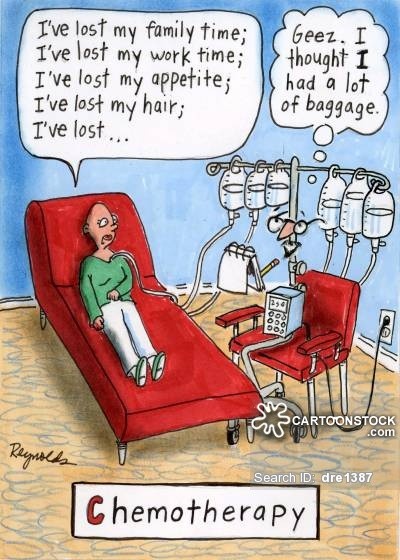
Recently Diagnosed or Relapsed? Stop Looking For a Miracle Cure, and Use Evidence-Based Therapies To Enhance Your Treatment and Prolong Your Remission
Multiple Myeloma an incurable disease, but I have spent the last 25 years in remission using a blend of conventional oncology and evidence-based nutrition, supplementation, and lifestyle therapies from peer-reviewed studies that your oncologist probably hasn't told you about.
Click the orange button to the right to learn more about what you can start doing today.
- You are here:
- Home »
- Blog »
- Multiple Myeloma »
- Myeloma Side Effects- Mucositis, Stomatitis, Dermatitis…
Myeloma Side Effects- Mucositis, Stomatitis, Dermatitis…

“…the incidence of stomatitis is increasing because of more intensive treatment and is often a dose-limiting factor in chemotherapy…”
Ever heard the terms mucositis, stomatitis or dermatitis? I hadn’t either.
I underwent an autologous stem cell transplant (ASCT) for multiple myeloma in December of 1995. I suffered a host of short, long-term and late stage side effects. Some were chemotherapy-induced, some were radiation-induced.
I was a strong 35 year old at the time. I can’t imaging the suffering that a pediatric cancer patient would undergo. My point is that aggressive chemotherapy can cause serious, painful short, long-term and late stage side effects- to any person, at any age.
Consider all evidence-based therapies- conventional or non-conventional.
The good news is that the cure rate for pediatric cancers has increased dramatically in recent decades. The bad news is that this is due, in part, to giving pediatric cancer patients more aggressive stem cell transplants. More aggressive meaning more chemotherapy. More aggressive chemotherapy has increased the occurrence of stomatitis.
I was fortunate not to have to deal with oral mucositis/stomatitis when I had my ASCT. It’s easy to ignore a side -effect like mouth sores. I mean, compared to many other short, long-term and late-stage side effects, mouth sores sound almost…well, this side effect doesn’t sound that bad.
Please believe me that stomatitis can be painful and “dose-limiting” meaning the pain from this side effect can be so severe that all therapy must cease in order to let the cancer patient heal.
If I were to undergo another ASCT, I would begin each an every therapy discussed below before I began chemo. And I would undergo these therapies daily…or at least frequently.
I am both a long-term MM survivor and MM coach. Though my experience and research have taught me that toxic chemotherapy and radiation may be necessary evils, side-effects of these toxic therapies must be identified and prevented as much as possible.
And my experience and research has taught me that short, long-term and late stage side effects from high dose chemotherapy can be minimized and even eliminated.
To Learn more about oral mucositis- click now
Are you a MM patient or MM caregiver? Are you about to undergo a stem cell transplant? Scroll down the page, post a question or comment and I will reply to you ASAP.
Thank you,
David Emerson
- MM Survivor
- MM Coach
- Director PeopleBeatingCancer
Editorial Comment: I was surprised to see an article about homeopathic medicine in the journal Cancer. Although the article was published in 2001 and involves children having bone marrow transplants, it apparently may work for many kinds of mouth problems during chemotherapy. TRAUMEEL is mentioned on the National Cancer Institute web site: http://www.cancer.gov/dictionary/?CdrID=367471
Recommended Reading:
- Multiple Myeloma Therapy- Late effects of Stem Cell Transplant, often debilitating
- Multiple Myeloma Stem Cell Transplant- Safe for Elderly- But Beneficial?
- Xerostomia aka Dry Mouth Therapy
Stomatitis
“Stomatitis is inflammation of the mouth and lips.[1] It refers to any inflammatory process affecting the mucous membranes of the mouth and lips, with or without oral ulceration.[2]
In its widest meaning, stomatitis can have a multitude of different causes and appearances. Common causes include infections, nutritional deficiencies, allergic reactions, radiotherapy, and many others…”
Stomatitis refers to inflammation in the mouth.
Esophagitis refers to inflammation of the esophagus.
Mucositis refers to inflammation in the mucous lining of the upper gastrointestinal tract from mouth to the stomach (mouth, lips, throat) and surrounding soft tissues.
Mouth Sores due to Chemotherapy
“Things You Can Do To Manage Oral Problems:
- Keep mouth and lips moist:
- Rinse mouth with water frequently (every 2 hrs while awake & when awake during the night). May add salt or baking soda (1/2 to 1 teaspoon in 8 ounces of water).
- Use saliva substitute (commercially available) if needed.
- Apply lip moisturizer often (i.e. chapstick).Suck on hard candies.
- Keep mouth & teeth clean.
- Use a soft-bristle toothbrush (can soften even more by placing the brush in very warm water), cotton swabs, mouth swabs (popsicle stick covered with gauze) to clean teeth after each meal and at bedtime.
- Clean dentures and/or bridge after eating. Leave out dentures if experiencing any discomfort.
- Floss gently with unwaxed floss (if platelet counts adequate).
- May use Water-Pik.
- Avoid:
- Mouthwash containing alcohol.
- Lemon glycerin swabs.
- Treat the discomfort/pain.
- Use topical or local agents such as Orajel, or Zilactin-B apply generously.
- Combination mouthwash can be made (ingredients may require a prescription).
- Use equal parts: xylocaine viscous solution, Zovirax® (alcohol-free), and Maalox®, or Mylanta®.
- Take 2 teaspoons every 2-4 hours as needed (swish around mouth and spit out).
- May be advised by a healthcare provider to swallow if experiencing discomfort while swallowing.
- For severe pain: oral or intravenous pain medication* may be required in addition to topical medication. (* prescribed by healthcare provider).
- Enhance healing:
- Apply Orabase®, Ulcerase®, etc. to irritated areas in the mouth or on lips.
- Apply Vitamin E (puncture cap 400IU and squeeze onto swab. Gently place swab on open area(s).
- Take an antacid 1/2-1 ounce every 3-4 hours as needed to decrease burning sensation.
- Maintain good nutrition focusing on high protein and high-calorie food which are soft and/or semi-liquid (i.e. scrambled eggs, puddings, blenderized or pureed foods). May use liquid supplements (i.e Carnation Instant Breakfast®, Ensure®, Boost®, etc.).
- Avoid:
- Hot, spicy, coarse or rough textured foods.
- Very hot or cold beverages and foods.
- Citric juices or foods containing citric acid (tomatoes, oranges, lemon, etc.).
- Alcoholic beverages or tobacco products.
- Liquid medication containing alcohol (i.e. some cough medicine) if not essential.
Drugs That May Be Prescribed by Your Doctor:
To treat or prevent infection the following may be used:
- Antifungals: Such as nystatin,clotrimazole, fluconazole
- Antibacterials: Mouthwash antiseptic, rinses are the basis of the oral decontamination regimen.
- Chlorhexidine gluconate (Peridex®, PerioGard®).
- Brush and floss teeth, and completely rinse toothpaste from the mouth, before using the rinse.
- Antivirals: Such as acyclovir (Zovirax®) or famciclovir (Famvir®)
To protect Gastrointestinal (GI) tract from irritants:
- Gastrointestinal agents: Sucralfate (Carafate®), comes in a liquid suspension form, protects the lining of the mouth to the stomach from irritants.
- Analgesics for pain control
When to Contact Your Doctor or Health Care Provider:
- Temperature greater than 100.5 F (38 C).
- Sores or ulcers in mouth or on lips that interfere with eating, drinking or sleeping.
- Pain or any sign of infection ( i.e tongue heavily coated).
- Symptoms increasing in severity despite above recommendations.
A randomized, controlled clinical trial of the homeopathic medication TRAUMEEL s® in the treatment of chemotherapy-induced stomatitis in children undergoing stem cell transplantation
“BACKGROUND- Stomatitis is a common consequence of chemotherapy and a condition for which there is little effective treatment. Although the management of patients with other chemotherapy-related toxicities has improved in recent years, the incidence of stomatitis is increasing because of more intensive treatment and is often a dose-limiting factor in chemotherapy. The authors assessed the efficacy of a homeopathic remedy, TRAUMEEL S®, in the management of chemotherapy-induced stomatitis in children undergoing bone marrow transplantation.


